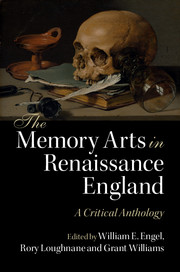Book contents
- Frontmatter
- Dedication
- Contents
- List of figures
- Acknowledgements
- A note on abbreviations
- Introduction
- PART I The art of memory
- PART II Rhetoric and poetics
- PART III Education and science
- PART IV History and philosophy
- PART V Religion and devotion
- Introduction to Part V
- V.1 Thomas More, A Treatise (Unfinished) upon these Words of Holy Scripture (1522)
- V.2 John Foxe, Acts and Monuments (1563)
- V.3 Thomas Playfere, The Pathway to Perfection (1593)
- V.4 Joseph Hall, selected works
- V.5 Richard Day, A Book of Christian Prayers (1608)
- V.6 Daniel Featley, ‘Four Rows of Precious Stones’ (1610)
- V.7 Lewis Bayly, The Practice of Piety (1613)
- V.8 John Donne, ‘Sermon, preached at Lincoln's Inn’ (1649)
- V.9 Stephen Jerome, A Minister's Mite (1650)
- V.10 E.M., Ashrea (1665)
- PART VI Literature
- Index
- References
V.9 - Stephen Jerome, A Minister's Mite (1650)
from PART V - Religion and devotion
Published online by Cambridge University Press: 05 August 2016
- Frontmatter
- Dedication
- Contents
- List of figures
- Acknowledgements
- A note on abbreviations
- Introduction
- PART I The art of memory
- PART II Rhetoric and poetics
- PART III Education and science
- PART IV History and philosophy
- PART V Religion and devotion
- Introduction to Part V
- V.1 Thomas More, A Treatise (Unfinished) upon these Words of Holy Scripture (1522)
- V.2 John Foxe, Acts and Monuments (1563)
- V.3 Thomas Playfere, The Pathway to Perfection (1593)
- V.4 Joseph Hall, selected works
- V.5 Richard Day, A Book of Christian Prayers (1608)
- V.6 Daniel Featley, ‘Four Rows of Precious Stones’ (1610)
- V.7 Lewis Bayly, The Practice of Piety (1613)
- V.8 John Donne, ‘Sermon, preached at Lincoln's Inn’ (1649)
- V.9 Stephen Jerome, A Minister's Mite (1650)
- V.10 E.M., Ashrea (1665)
- PART VI Literature
- Index
- References
Summary
About the author
Stephen Jerome (1604–50) held clerical posts until 1622 when he went to Ireland and tutored the Earl of Cork's son. He preached before the lords justices in Dublin and later delivered an anti-royalist sermon at Christ Church. He was in Greenwich in 1650 when he wrote A Minister's Mite.
About the text
The advertisement to the buyer offers a jaunty poetic rendering of the book's modest aim: to supply and justify a set of rules for stocking one's memory with useful bits of information. The title recalls the parable of the widow's mites (Luke 21:2 and Mark 12:42), suggesting that the book appears slight and yet conveys something of great value. The text is a dialogue between instructor (Præceptor) and student (Puer). Readers are invited to see – and be amused by – principles of profitable retention. The sixth point presents a three-tiered house of memory.
The arts of memory
Jerome rehearses what passed as general knowledge as regards exercising and strengthening memory (including what food and drink to favour or avoid), as well as tales about prodigious memories (see Lloyd, IV.1). Along the way readers are given names of the best commonplace books, and brief characterisations of their specific uses, out of which to compile and arrange their own art of memory.
Textual notes
A Ministers Mite: Cast into the stocke of a weake memory (London, 1650), A2r–C3v.
A Minister's Mite
Præceptor. These rules I did dictate unto you, as removals of the remoras and obstructions, both to youth and to years, in remembering of sermons, and you do well to remember them, and yet you have not repeated all.
Puer. Indeed Sir, I find what you told me, that my memory was like a sieve or a riddle, which leaks out the pure water, and keeps in the dirt and dross. I can remember toys and tales, and ballads and bables, better than solid matter; as weak stomachs be more filled oft with wind than with good meat, and as a child's pocket is filled with trash and pebble stones, rather than with gold and good things. Yet now I call to mind some other rules you prescribed to my memory.
- Type
- Chapter
- Information
- The Memory Arts in Renaissance EnglandA Critical Anthology, pp. 264 - 269Publisher: Cambridge University PressPrint publication year: 2016



